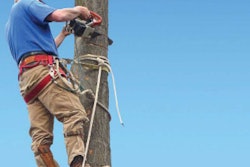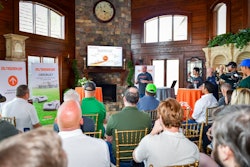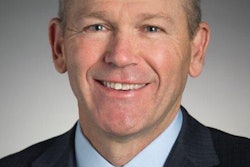For some, gender is no longer an issue, but for others, challenges remain.
The number of women working in landscaping has grown significantly in recent years, with women filling roles in every facet of the industry. Once a male-dominated profession, the playing field has been leveled as more women graduate with degrees in horticulture and landscape architecture and with technology advances.
“When I started in the business 40 years ago, it was a good-old-boys network,” says Dave Hanson, senior vice president at ValleyCrest Landscape Maintenance. “Today, it’s much different, and opportunities are equal.”
Kathleen Dangelo, co-owner, Ohio Valley Group: This complete backyard renovation includes a bluestone patio, deck, pergola and outdoor stone bar with graniteEasier-to-operate equipment has taken the “brawn factor” out of many of the hands-on jobs, Hanson says, and horticulture and landscape architecture programs have graduated many more women in the past 10 years. ValleyCrest employs women at all levels of the company, from crewmembers to executives.
“I see it as a trend that will continue. Gender is no longer relevant,” Hanson says.
From a business savvy partner and an industry veteran to a risk-taking owner and a visionary newbie, here are portraits of four representative women who have paid their dues, focused on their strengths, tapped into their talents and taken risks – all actions that have led to success.
The Business Savvy Partner
Most contractors know how to landscape. It’s the day-to-day administrative and managerial operations that often prove to be the most challenging part of running a landscape business.
In that regard, the Ohio Valley Group boasts an exemplarily partnership. Husband Andy Dangelo manages the landscaping and wife Kathleen, an attorney, handles the business operations, such as hiring new staff, writing contracts, marketing and financing equipment.
“We’re a good example for the industry. We’re a husband and wife team who are equal, yet bring different skills to the table,” Kathleen says.
Their winning combination led to the Dangelos being nominated as TLC Landscaper of the Year Finalists in 2009. The couple started the Ohio Valley Group nearly 20 years ago in a spare bedroom of their home, while Kathleen, now 46, was in her second year of law school. Since then, it has grown into a multimillion dollar, full-service business.
“We are a husband and wife team who are equal.”
When she graduated from law school, Dangelo went to work for a large, corporate firm in Cleveland but still helped manage the landscaping business on the side – all the while raising three small children. She then turned in her corporate briefcase and went to work full time for the family business. It gave her more flexibility with her children, she says.
“Coming into the business as a lawyer garnered me instant respect [with male employees and within the industry] that I may not have received otherwise,” she says.
Her legal expertise also gives her business insight others may not naturally have. “My law background helps me see problems sometimes before they arise, helping us to avoid them,” she says.
Dangelo hires all of the company’s employees and says gender plays no role in the selection process. The team includes two female office administrators, a female field manager and two female crew leaders. “Diversity is always good. I don’t want to work with people exactly like me because I would miss some of the best ideas.”
Adding women to staff also creates positive peer pressure to eliminate the machismo culture that can often make male and female employees and customers uncomfortable, Dangelo says.
The VP
Being in the landscape industry, you’ve probably heard of ValleyCrest, one of the largest businesses that manages projects and properties across the country. But you may not have heard of Nada Duna. She’s the kind of executive who still likes to get her hands dirty and would rather know your name than to be in the limelight herself.
Duna, 50, serves as senior vice president of ValleyCrest Landscape Maintenance, a division of ValleyCrest Landscape companies, and has been with the firm for 25 years. Her division provides horticultural services in more than 120 locations around the country at corporate office campuses, resorts, retail centers, colleges, cemeteries, museums, public spaces and homeowners associations.
Nada Duna, senior vice president, ValleyCrest Landscape Maintenance: Duna manages the maintenance of a variety of properties including Metro Center, a mixed-use, corporate campus in Foster City, COf her 500 employees in the region, Duna knows almost everyone by name. She manages the budgets, visits the sites, meets with clients and coordinates with the various departments in her division.
“I like the dynamics of being in the office and managing the numbers, meeting with clients and working with the crews in the field. It’s fast paced, and I like it that way,” she says.
Duna came to ValleyCrest as an optimistic 24-year-old who had graduated with a master’s degree in plant pathology from American University of Beirut in Lebanon. She left the country and went to the United States to escape the war and continue her studies as a research assistant with an American professor she met while he was visiting Lebanon.
Duna started her career at ValleyCrest in the field, working with a predominately male crew. She recalls how initially some of the crew members made belittling remarks in front of her in Spanish, not knowing she was fluent in the language.
“I did everything they asked. I picked up dead birds and trash; I drove equipment; I worked hard. Then, on my 90th day there, I answered one of the crew in Spanish.
“There was dead silence,” she says with a laugh. “But ultimately, I earned their respect because I worked hard.”
And now, as a manager, she works even harder.
“My advice to anyone new to the business would be to come in with an open mind,” she says. “Do the work that you ask other people to do. And ask their opinions. It makes them feel needed. If you do the right thing, they will respect you for it.”
The Small Business Owner
Going out on your own to start a new business can be risky. But that didn’t stop Debbie Roberts, even when she was five months pregnant.
Roberts didn’t see the risks of starting a business. She only saw the possible rewards. “I knew it would give me a more flexible schedule, and I could make more money at it than what I was already doing.”
Debbie Roberts, owner, Plant Concepts: While her expertise at the start of her career was working with plants, Roberts has successfully developed her business into a full-service enterpriseBefore starting her company Plant Concepts in Lenoir City, Tennessee, Roberts worked as a grower at a local green house, planting and caring for flower beds at small residential projects on the weekends. She had a degree in horticulture from Auburn University and had worked in the landscaping industry since high school. Through speaking engagements at local garden clubs, she cultivated a list of clients who hired her for side jobs.
Today, Roberts, 33, still calls on many of those clients. In fact, she has achieved so much success through word-of-mouth and referrals that she doesn’t advertise. She employees five crew members and offers a full range of services that include hardscaping, design/build and maintenance.
She sums up her philosophy this way: “You have to love what you do to be in this business and be willing to take some risks.”
Her son Logan, 5, now in kindergarten, accompanies Roberts on many jobs, which she hopes will instill him with a good work ethic. When he was a baby, Roberts would place him under a shady tree in his car carrier as she weeded flower beds. Now that Logan is older, the flexibility of being her own boss allows Roberts to attend his soccer games, although it may mean crunching numbers and balancing the budget until 1 a.m. after the game.
She sums up her philosophy this way: “You have to love what you do to be in this business and be willing to take some risks.”
The Up & Coming Designer
Maybe it’s her age, or what she has experienced, or a combination of both. But Laura Kloosterman, 25, sees the landscape industry as gender neutral. In fact, she wishes her peers would stop forcing the subject of gender into business conversations.
Laura Kloosterman, designer and sales associate, Reinhart Grounds Maintenance: Designed by Kloosterman, this plan explores how to transform a historic Florida estate into a conference center and wedding ve“The implication is that we as women are more able to relate to clients and communicate more warmly. That is an unnecessary stereotype,” she says.
Kloosterman, a landscape architect with a degree from the University of Florida would rather be judged on her merits than her gender. To give someone a leg up simply because she is female is just as bad as putting her down because of her gender, she says. “The education and skills I have are the assets I bring to the table.”
She worked in a nursery before joining Reinhart Grounds Maintenance. The job posed some physical demands such as heavy lifting that were challenging, unlike her current job, which is more about creativity and communicating with the clients.
“My strength is being able to visualize a potential landscape and then convey it to someone else verbally and through my drawings,” she says.
It all started when her high school calculus teacher encouraged Kloosterman to investigate a career in landscape design and put her in touch with a former female student who worked as a designer. About one third of Kloosterman’s landscape architecture class at Florida was female.
“I have a lot of female role models who have been in the profession for a long time and paved the way. I know I would have faced a lot more challenges if I came into the career earlier,” she says.
“I’m sure there will always be challenges and stereotypes, but I see more doors being open as long as women are willing to walk through them.”
National Association of Professional Women in Landscape
After attending several male-dominated landscape industry networking events, Angelia Woodside Beckstrom came away feeling lost and unconnected. But the experience inspired her to create the National Association of Professional Women in Landscape (NAPWL) early last year.
“I knew I needed to find a professional association that worked for me where I didn’t feel like the little lady or an ornament.” she says.
After attending an industry event sponsored by John Deere Landscapes, which provided classes and networking opportunities for women in the green industry (the next Women in the Green Industry event is scheduled for late September in Newport Beach, California), Beckstrom saw a light at the end of the tunnel.
“The event completely inspired me. I stood a little taller the following year and knew I had to make it to that event every year. It was like my oxygen.”
Currently, NAPWL has 700 members and is forming new chapters across the country.
“The organization is a neutral ground that welcomes any woman who touches landscape. Everyone is welcome and respected,” Beckstrom says.
“People listen to each other and ask questions. It’s a good place to cross train and educate yourself.”
For more information, visit napwl.com.









